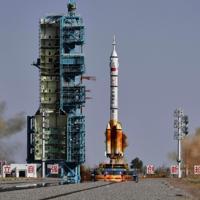Hijacked Satellites and Orbiting Weapons: Space Turns Hostile
As Russia held its Victory Day parade this year, hackers backing the Kremlin hijacked an orbiting satellite that provides television service to Ukraine, beaming in Moscow's parade footage instead of Ukrainian programming. The brazen move highlighted the growing threat of space-based warfare, where satellites can be used as tools for intimidation and disruption.
The satellite hack serves as a stark reminder that 21st-century war is no longer confined to land, sea, and air. Cyberattacks and space-based operations are becoming increasingly sophisticated, making it difficult for nations to distinguish between legitimate and malicious activities in outer space. Disabling a satellite can have devastating consequences without firing a single bullet, and hackers can exploit vulnerabilities in a satellite's security software or disrupt its ability to communicate with Earth.
"If you can impede a satellite's ability to communicate, you can cause a significant disruption," said Tom Pace, CEO of NetRise, a cybersecurity firm. "Think about GPS...Imagine if a population lost that and the confusion it would cause."
With over 12,000 operating satellites orbiting the planet, these spacecraft play a critical role in broadcast communications, military operations, navigation systems like GPS, intelligence gathering, and economic supply chains. This makes them a significant national security vulnerability, and a prime target for anyone looking to undermine an adversary's economy or military readiness.
Hackers typically look for the weakest link in the software or hardware that supports a satellite or controls its communications with Earth. For instance, during Russia's invasion of Ukraine in 2022, someone targeted Viasat, the U.S.-based satellite company used by Ukraine's government and military. The hack, which Kiev blamed on Moscow, used malware to infect tens of thousands of modems, creating an outage affecting wide swaths of Europe.
National security officials warn that Russia is developing a nuclear, space-based weapon designed to take out virtually every satellite in low-Earth orbit at once. This weapon would combine a physical attack that would ripple outward, destroying more satellites, while the nuclear component would fry their electronics. While both Russia and China are believed to be less reliant on the same kinds of satellites as the U.S., they still pose a threat.
Valuable minerals and other materials found on the moon and in asteroids could lead to future conflicts as nations look to exploit new technologies and energy sources. Acting NASA Administrator Sean Duffy announced plans to send a small nuclear reactor to the moon, saying it's essential for the U.S. to do so before China or Russia. The moon is rich in helium 3, a material that scientists believe could be used in nuclear fusion to generate huge amounts of energy.
Control over the moon in the intervening years could determine which countries emerge as superpowers, according to Joseph Rooke, a London-based cybersecurity expert. "This isn't sci-fi. It's quickly becoming a reality," he said. "If you dominate Earth's energy needs, that's game over." China and Russia have announced plans for their own nuclear plants on the moon in the coming years, while the U.S. is planning missions to the moon and Mars.
Artificial intelligence is likely to speed up the competition, as is the demand for the energy that AI requires. The stakes are high, and the world is witnessing a new era of space-based warfare where satellites can be used as tools for intimidation, disruption, or even control.
